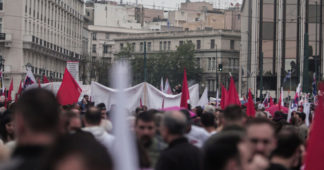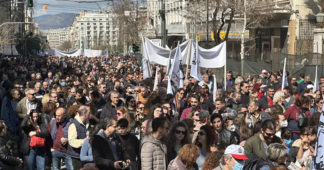“We are striking against the increasing cost of living crisis, we are striking for better wages”
Apr. 9, 2025
Today’s national strike in Greece was a push for immediate measures to address the cost of living crisis in the country.
Called by ADEDY and GSEE, the two largest umbrella unions in Greece, the demands were centered around collective labor agreements, wage increases, and measures to curb inflation and address the housing crisis.
“The government’s minimum wage increases are much smaller than the rising cost of living and inflation, so that we have lost a large part of our purchasing power of our wages,” stated GSEE President Yannis Panagopoulos, arguing that today’s wages were “in Tartarus.”
Inflation in Greece has hovered around 3% the past few months, much higher than the eurozone average. In the latest Eurobarometer survey, Greeks put inflation, price increases and the cost-of-living as their top concerns.
Workers on the street in Athens echoed these sentiments to To Vima International: “We are striking for all those workers who didn’t go home due to the the 300 some workplace accidents last year, we are striking against the increasing cost of living crisis, we are striking for better wages and we are striking against what is called the ‘war economy’, which is basically cutting money from our needs to fund wars respectively for their profits,” stated a worker who gave his name as Vagelis who was with the industry sector unions at the strike demonstration in Athens.
Greece recently announced a €25 Billion defense plan, which was met with pushback and outrage from some opposition parties.
However, workers, posters, and speakers on megaphones also underlined that the April 9 strike was additionally, another call for accountability in the Tempi train tragedy.
“I’m not prepared to see a government of murderers, who two years after Tempi we see that they continue this destructive policy with absolutely no accountability taken,” said Kostas, who stated he was an education worker. “And this is reflected in the reactions of the people, in the demonstrations, prominently, the February 28 demonstrations. And today’s generalization strike is a continuation of that strike.”
A national strike on the 28 of February, the two-year anniversary of the train tragedy, was by some counts, the biggest Greece has seen since the fall of the dictatorship. Hundreds of thousands went on strike across Greece, calling for accountability and justice for the 57 people who were killed in the train crash. Slogans that were common at previous Tempi demonstrations percolated through the crowd again today– “we don’t have oxygen” or “murders”.
“The state no matter how much it tries to pretend that it is not listening, no matter how much the prime minister came out to say that he wants a stronger government, we are sure that he is listening,” said Vagelis, “He can’t not listen because when the majority of workers went out and demonstrated and participated in that strike.”
We remind our readers that publication of articles on our site does not mean that we agree with what is written. Our policy is to publish anything which we consider of interest, so as to assist our readers in forming their opinions. Sometimes we even publish articles with which we totally disagree, since we believe it is important for our readers to be informed on as wide a spectrum of views as possible.











